Related Research Articles

The Thirteenth Amendment to the United States Constitution abolished slavery and involuntary servitude, except as punishment for a crime. The amendment was passed by the Senate on April 8, 1864, by the House of Representatives on January 31, 1865, and ratified by the required 27 of the then 36 states on December 6, 1865, and proclaimed on December 18. It was the first of the three Reconstruction Amendments adopted following the American Civil War.

The Reconstruction era was a period in American history following the American Civil War (1861–1865) and lasting until approximately the Compromise of 1877. Its main goals were to rebuild the nation after the war, reintegrate the former Confederate states, and address the social, political, and economic impacts of slavery.
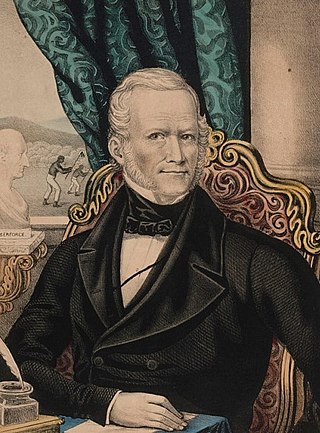
James Gillespie Birney was an American abolitionist, politician, and attorney born in Danville, Kentucky. He changed from being a planter and slave owner to abolitionism, publishing the abolitionist weekly The Philanthropist. He twice served as the presidential nominee for the anti-slavery Liberty Party.

Historians who address the origins of the American Civil War today agree that the preservation of the institution of slavery was the principal aim of the 11 Southern states that declared their secession from the United States and united to form the Confederate States of America. However, while historians in the 21st century agree on the centrality of the conflict over slavery—it was not just "a cause" of the war but "the cause" according to Civil War historian Chris Mackowski—they disagree sharply on which aspects of this conflict were most important, and on the North’s reasons for refusing to allow the Southern states to secede. Proponents of the pseudo-historical Lost Cause ideology have denied that slavery was the principal cause of the secession, a view that has been disproven by the overwhelming historical evidence against it, notably the seceding states' own secession documents.
Popular sovereignty is the principle that the authority of a state and its government are created and sustained by the consent of its people, who are the source of all political power. Popular sovereignty, being a principle, does not imply any particular political implementation. Benjamin Franklin expressed the concept when he wrote that "In free governments, the rulers are the servants and the people their superiors and sovereigns".

In the United States before 1865, a slave state was a state in which slavery and the internal or domestic slave trade were legal, while a free state was one in which they were prohibited. Between 1812 and 1850, it was considered by the slave states to be politically imperative that the number of free states not exceed the number of slave states, so new states were admitted in slave–free pairs. There were, nonetheless, some slaves in most free states up to the 1840 census, and the Fugitive Slave Act of 1850 specifically stated that a slave did not become free by entering a free state.

In the United States the period 1849 and 1865 was dominated by the tensions that led to the American Civil War between North and South, and the bloody fighting in 1861-1865 that produced Northern victory in the war and ended slavery. At the same time industrialization and the transportation revolution changed the economics of the Northern United States and the Western United States. Heavy immigration from Western Europe shifted the center of population further to the North.
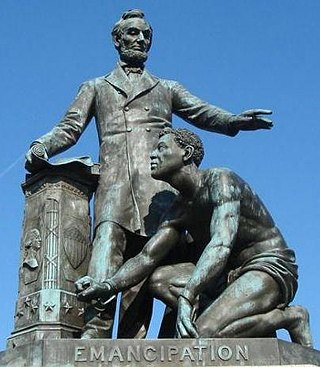
Abraham Lincoln's position on slavery in the United States is one of the most discussed aspects of his life. Lincoln frequently expressed his moral opposition to slavery in public and private. "I am naturally anti-slavery. If slavery is not wrong, nothing is wrong," he stated. "I can not remember when I did not so think, and feel." However, the question of what to do about it and how to end it, given that it was so firmly embedded in the nation's constitutional framework and in the economy of much of the country, was complex and politically challenging. In addition, there was the unanswered question, which Lincoln had to deal with, of what would become of the four million slaves if liberated: how they would earn a living in a society that had almost always rejected them or looked down on their very presence.
James R. Stoner Jr. is Hermann Moyse Jr. Professor and Director of the Eric Voegelin Institute in the Department of Political Science at Louisiana State University. Stoner specializes in political theory, English common law, and American constitutionalism.
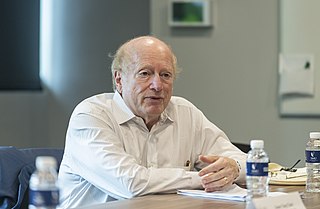
Mark Victor Tushnet is an American legal scholar. He specializes in constitutional law and theory, including comparative constitutional law, and is currently the William Nelson Cromwell Professor of Law at Harvard Law School. Tushnet is identified with the critical legal studies movement.

Landon Cabell Garland (1810–1895), an American, was professor of physics and history and university president three times at different Southern Universities while living in the Southern United States for his entire life. He served as the second president of Randolph–Macon College in Ashland, Virginia, from 1836 to 1846; then professor from 1847 to 1855, and then third president of the University of Alabama in Tuscaloosa, Alabama, from 1855 to 1867; and first chancellor of Vanderbilt University in Nashville, Tennessee, from 1875 to 1893. He was an apologist for slavery in the United States before the Civil War, but afterward became a vociferous spokesperson against slavery.
Constitutional theory is an area of constitutional law that focuses on the underpinnings of constitutional government. It overlaps with legal theory, constitutionalism, philosophy of law and democratic theory. It is not limited by country or jurisdiction.

Thomas McIntyre Cooley was the 25th Justice and a Chief Justice of the Michigan Supreme Court, between 1864 and 1885. Born in Attica, New York, he was father to Charles Cooley, a distinguished American sociologist. He was a charter member and first chairman of the Interstate Commerce Commission (1887).
Walter Lynwood Fleming (1874–1932) was an American historian of the South and Reconstruction. He was a leader of the Dunning School of scholars in the early 20th century, who addressed Reconstruction era history using historiographical technique. He was a professor at Vanderbilt University from 1917 through his career, also serving as Dean of the School of Arts and Sciences, and Director of the Graduate School. A prolific writer, he published ten books and 166 articles and reviews. The son of a plantation owner who had slaves, Fleming was sympathetic to White supremacist arguments and Democratic Party positions of his era while critical of Republicans and Reconstruction.
Popular sovereignty is a doctrine rooted in the belief that each citizen has sovereignty over themselves. Citizens may unite and offer to delegate a portion of their sovereign powers and duties to those who wish to serve as officers of the state, contingent on the officers agreeing to serve according to the will of the people. In the United States, the term has been used to express this concept in constitutional law. It was also used during the 19th century in reference to a proposed solution to the debate over the expansion of slavery. The proposal would have given the power to determine the legality of slavery to the inhabitants of the territory seeking statehood, rather than to Congress.
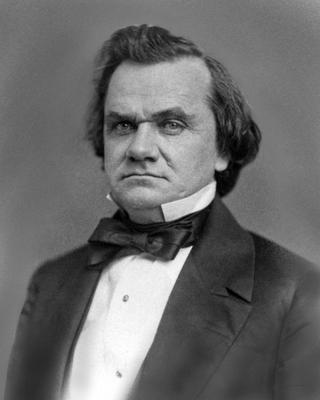
Stephen Arnold Douglas was an American politician and lawyer from Illinois. A senator, he was one of two nominees of the badly split Democratic Party for president in the 1860 presidential election, which was won by Republican candidate Abraham Lincoln. Douglas had previously defeated Lincoln in the 1858 United States Senate election in Illinois, known for the pivotal Lincoln–Douglas debates. He was one of the brokers of the Compromise of 1850 which sought to avert a sectional crisis; to further deal with the volatile issue of extending slavery into the territories, Douglas became the foremost advocate of popular sovereignty, which held that each territory should be allowed to determine whether to permit slavery within its borders. This attempt to address the issue was rejected by both pro-slavery and anti-slavery advocates. Douglas was nicknamed the "Little Giant" because he was short in physical stature but a forceful and dominant figure in politics.
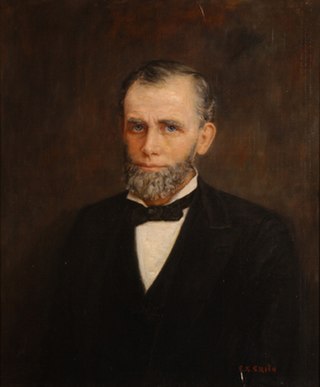
Nathaniel Thomas Lupton was an American chemist and university professor. He served as the President of the University of Alabama from 1871 to 1874. Additionally, he served as State Chemist of Alabama.
This article documents the political career of Abraham Lincoln from the end of his term in the United States House of Representatives in March 1849 to the beginning of his first term as President of the United States in March 1861.
Keith E. Whittington is an American political scientist.
William S. Brewbaker III is an American legal scholar.
References
- ↑ "Mr. Mark E. Brandon Profile | Tuscaloosa, AL Lawyer | Martindale.com". www.martindale.com. Retrieved 11 May 2023.
- 1 2 3 4 "Alabama School of Law taps Vanderbilt professor as new dean". The Tuscaloosa News. May 13, 2014. Retrieved November 1, 2017.
- 1 2 3 "Mark E. Brandon". The University of Alabama. Retrieved November 1, 2017.
- ↑ Reviews of Free in the World include:
- Davis, Thomas J. (1 September 1999). "Free in the World: American Slavery and Constitutional Failure. By Mark E. Brandon. (Princeton: Princeton University Press, 1998. xviii, 248 pp. $39.50, ISBN 0-691-01581-3.)". Journal of American History. 86 (2): 780–781. doi:10.2307/2567105. JSTOR 2567105.
- Hall, Mark E. (February 2000). "Hall on Brandon, 'Free in the World: American Slavery and Constitutional Failure'". H-Shear.
- Brandwein, Pamela (June 1999). "Free in the World: American Slavery and Constitutional Failure. By Mark E. Brandon. Princeton, NJ: Princeton University Press, 1998. 248p. $39.50". American Political Science Review. 93 (2). doi:10.2307/2585423. JSTOR 2585423. S2CID 147672107.
- ↑ Reviews of States of Union include:
- "States of Union: Family and Change in the American Constitutional Order Mark E. Brandon. (Lawrence: University Press of Kansas, 2013. xiv, 335 pp. $37.50.)". Journal of American History. 101 (3): 888. December 2014. doi:10.1093/jahist/jau549.
- Subramanian, Narendra (June 2016). "States of Union: Family and Change in the American Constitutional Order. By Mark E. Brandon. Lawrence: The University Press of Kansas, 2013. 352p. $37.50". Perspectives on Politics. 14 (2): 510–512. doi:10.1017/S1537592716000347. S2CID 148331508.